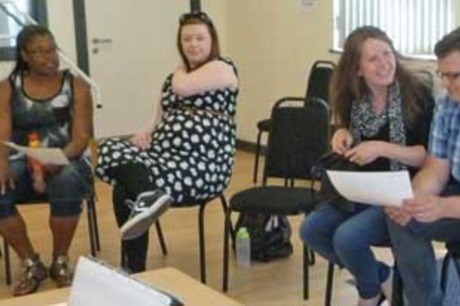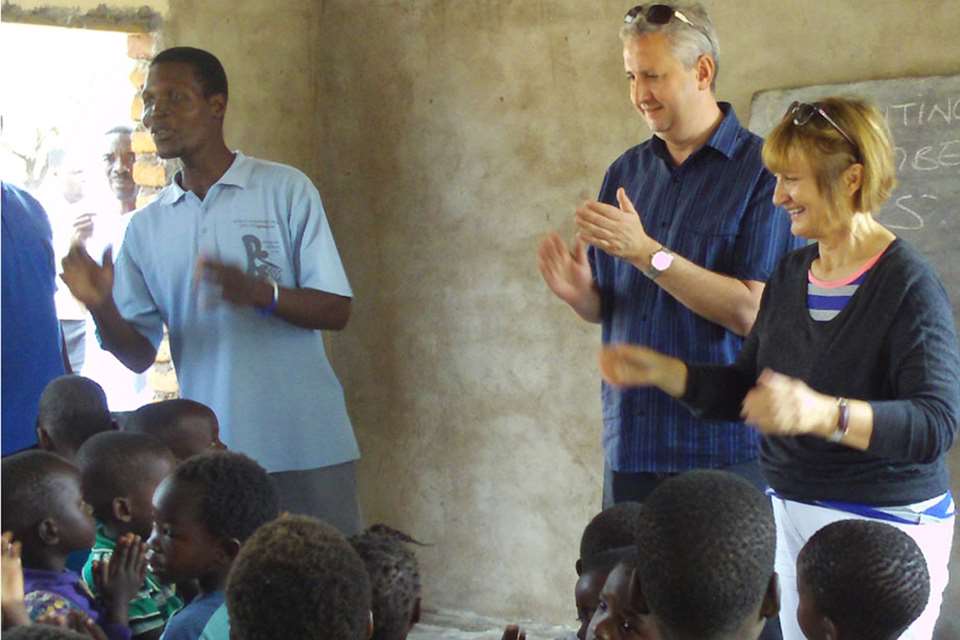Integrated Working: Hand in hand
Monday, July 14, 2014
New initiatives are bringing together expertise from the health service, early years sector and care in an effort to improve provision for children. Katy Morton investigates.

Joined-up working has long been a popular idea in the NHS. Politicians in the 1960s stressed the importance of integration of services, and in the late 1990s Labour said it wanted to break down the 'Berlin Wall' between health and social services. Despite this, little was done to make joined-up working a reality; efforts to achieve it were slow.
Fast forward to the current administration, and there now appears to be a renewed push for collaborative working as pressures on the health service have increased due to a lack of funding and an ageing and growing population.
A number of initiatives have been introduced to join up education, health and care services, with several in the pipeline, while the new Children and Families Act 2014 pushes for integrated working (see box).
Here is a snapshot of some of the initiatives that are increasingly embracing children's centres, early years settings and schools.
THE INTEGRATED PROGRESS CHECK AT TWO
The integrated two-year-old check, due to come in next year, will bring together the Health Check and the Progress Check at Age Two - the two development reviews currently used to assess children's development at 24-36 months old and identify opportunities for early intervention.
The Department for Education (DfE) and Department of Health (DoH) chose five pilot sites (Islington, Leeds, Medway, Norfolk, Northamptonshire) to test models for the integrated review for 12 months, alongside five pilot partners.
Findings from the local authorities involved and other partners are due to be published in a report by the National Children's Bureau in late August or early September. 'Initial findings from the pilots reveal that parents like the integrated check, but were surprised that early years and health professionals don't talk to each other already,' says Sue Robb, head of early years at 4Children, which will publish the results on its website.
'While parents gave positive feedback, those piloting the single review said it was very time-consuming and could prove expensive,' she adds. 'I think the two checks will remain and be combined, but information sharing will become a priority. This will have the biggest impact, rather than the actual check.'
NHS PIONEERS PROGRAMME
Last November, the NHS announced the 14 pioneers that will explore innovative approaches to multi-agency working under its 'pioneers' programme.
The aim of the programme is to make health and social care services work together to provide better support at home and earlier treatment in the community to prevent people needing emergency care in hospital or care homes.
Leeds, one of the pioneers, has set up a programme to integrate health visiting and children's centres into a new Early Start Service across 25 local teams in the city.
Under the service, health visitors use a health check at home to discuss with new mothers what their needs are and direct them to services at their local children's centres.
According to Leeds City Council, the Early Start Service has meant that children and families now experience one service, which supports their health, social care and early educational needs and champions the importance of early intervention.
Andrea Richardson, head of early help services at the council, explains, 'In Leeds, our vision is to be a child-focused city. To achieve this, we wanted to integrate services for children and their families, and have services work in parallel.
'A big hurdle to doing this in the past has been restrictions to information sharing. However, we have got over this by making children's centre staff and health visitors, who have fortnightly meetings to discuss families they are working with, sign a legally binding agreement to attend.'
Ms Richardson says that in the 12 months that the council has been operating the service, the number of face-to-face antenatal contacts have more than doubled to 94 per cent. The number of looked-after children has also dropped from 443 to 414.
Along with the Early Start Service, Leeds has put in place an approach to improving care for older people and those with long-term conditions as part of its work as a pioneer. Twelve health and social care teams have been employed to co-ordinate care, as well as a new joint recovery centre to prevent hospital admissions and earlier discharge. In the centre's first month, the length of hospital stays reduced by 50 per cent.
OUR CHILDREN, OUR COMMUNITY, OUR FUTURE, SOUTHEND-ON-SEA
Our Children, Our Community, Our Future, a partnership between the Pre-school Learning Alliance and Southend-on-Sea Borough Council, is one of four early intervention initiatives being funded by the Big Lottery over ten years to improve children's life chances.
Part of the Lottery's Fulfilling Lives: A Better Start programme, the Southend project brings together members of the community, practitioners, researchers and breastfeeding support workers to transform maternity care and services from birth to three.
As part of this, a Centre of Excellence, Innovation and Best Practice will be created in Southend, Essex, where professionals will work in partnership with each other and parents. Training courses for health and early years professionals, along with classes for parents, will also run at the centre.
Dawn Harvey, Pre-School Learning Alliance senior development officer for Southend-on-Sea Borough Council, says the project was developed in response to parents' frustrations about a lack of joined-up delivery, inconsistent messages and mis-information. 'It was agreed that a shared space was needed where professionals could meet together to break down barriers and learn about what other services do - also, to re-evaluate and design services, with input from parents,' she explains.
'The Centre for Excellence, Innovation and Best Practice will be an inter-agency setting for professionals from all sectors to come together to develop new methods and approaches. It will be a community resource with information and signposting for families and professionals, and have a social enterprise cafe and creche run by high-quality staff.'
Under the initiative, a new set of standards, The Southend Way, will also be developed at the centre, and anyone working with families and young children in Southend will be required to follow them.
The effectiveness of the initiative will be measured across the ten years by the University of Warwick and the London School of Economics.
BUMP 2 BABE, LUTON

A co-facilitated approach is taken at Luton children's centres where a team of midwives, centre staff and health visitors work together to deliver antenatal classes to vulnerable families.
The Bump 2 Babe programme is open to women from 28 weeks of pregnancy, and their partners. Classes are run across the city's seven centres and take place over six weeks - five during pregnancy and one postnatal session.
The programme was developed from the DoH's Preparation for Pregnancy, Birth and Beyond and encompasses pregnancy well-being, including early attachment, labour and birth, infant feeding, baby's development and safety.
The initiative was developed in response to a lack of antenatal education available to parents in the city and was introduced after a pilot in 2009/10 managed to increase the number of vulnerable families accessing the children's centre and improve breastfeeding rates.
Sharon Wheeler, Luton children's centre hub and midwifery manager, explains, 'It became apparent that a universal antenatal programme was required, as locally the only antenatal education offered was via private National Childbirth Trust courses or sporadic one-off sessions led by community midwives.'
To ensure the sustainability of the programme, a collaborative approach to its delivery was taken. Ms Wheeler created step-by-step lesson plans for community midwives, health visitors and children's centre outreach workers to follow.
Community midwives deliver sessions one and two of the programme, the health visiting team delivers session three, the infant feeding team runs session four, and children's centre outreach runs sessions five and six.
With the support of two part-time midwives, employed in 2010 to work in the children's centres with funding from the Early Intervention Grant, the project was rolled out across the city's centres.
'All bookings for antenatal education come via the Children's Centre Midwifery Team (CCMT), which organises all sessions and ensures facilitators are available for the sessions,' explains Ms Wheeler. 'CCMT delivers training to children's centre staff and health partners on facilitating their session of the Bump 2 Babe programme, along with auditing the quality and content delivery.'
Ms Wheeler says that an audit of the programme in November 2013 revealed how the classes help prepare attendees for birth and parenthood and increase their confidence.
'Parents' knowledge of how to bond with their baby, where to seek advice, and their understanding of health issues increased with the programme, as did their intention to breastfeed', says Ms Wheeler. 'Before attending the classes, 53 per cent of mothers intended to breastfeed. This increased to 75 per cent post-programme.
'Long-term predictions of outcomes suggest improvement in parent-child relationships, reductions in maternal mental health issues and increased rates of breastfeeding.'
CHILD AND ADOLESCENT MENTAL HEALTH SERVICES, CAMDEN
Since 2011, Camden's Child and Adolescent Mental Health Service (CAMHS) clinicians have been supporting teachers, staff, children and their families throughout the London borough's primary and secondary schools. Their aim is to help parents and school staff work with and understand children's difficulties along developmental, emotional, behavioural, social and learning lines.
Frequent concerns include transitions when starting school and moving to secondary school, struggles with peers, challenges with learning and emotional aspects including shyness, uncertain confidence, anxiety and frustration management.
Typically clinicians visit schools for half a day a fortnight. However, CAMHS clinical psychologist Jan Eaton says that some primary schools have opted to pay for additional time to extend CAMHS' involvement.
She explains, 'Usually a CAMHS clinicians will link with one or two identified school staff, commonly a deputy head and Special Educational Needs and Disability Co-ordinator. What clinicians do depends on the specific requests from the school. Most of the work focuses on concerns about a particular child or sometimes a group of children or a year group.
'During a consultation, clinicians and school staff will discuss the nature and background of the concerns and what the school has already tried, and then devise a plan. For example, queries might focus on challenging behaviour in class, bullying, reluctance to try or a bolshie group in class', explains Dr Eaton.
'Ideally, CAMHS clinicians will suggest strategies for dealing with the behaviour. However, we find that most of the time teachers are incredibly resourceful, so sometimes it is just about making small tweaks to techniques or thinking together about what else to try.
'If a member of school staff doesn't make headway quickly then we talk about involving their parents. Sometimes staff get a change in behaviour, but if problems are complex, children may require long-term input.'
While clinicians have a duty to honour confidentiality, Dr Eaton says they know that sharing some information with the school can facilitate tailoring the work for a specific child.
She explains, 'Clinicians aim to work collaboratively with the child, their family and the school. Understandably, people are sometimes concerned about whether what is said is private. For the most part, parents understand that the clinicians are there to help their children.'
According to Dr Eaton, having a CAMHS presence in schools makes it easier for staff, parents and children to approach clinicians and helps to normalise a focus on children's psychological well-being and enjoyment. Their work in schools has also led to CAMHS clinicians building close relationships with settings.







